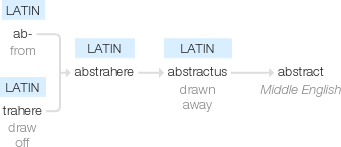Abstract
Middle English: from Latin abstractus, literally ‘drawn away’, past participle of abstrahere, from ab- ‘from’ + trahere ‘draw off’.
wiktionary
From Middle English abstract, borrowed from Latin abstractus, perfect passive participle of abstrahō(“draw away”), formed from abs-(“away”) + trahō(“to pull, draw”). The verbal sense is first attested in 1542.
etymonline
abstract (adj.)
late 14c., originally in grammar (in reference to certain nouns that do not name concrete things), from Latin abstractus "drawn away," past participle of abstrahere "to drag away, detach, pull away, divert;" also figuratively, from assimilated form of ab "off, away from" (see ab-) + trahere "to draw," from PIE root *tragh- "to draw, drag, move" (see tract (n.1)).
The meaning in philosophy, "withdrawn or separated from material objects or practical matters" (opposed to concrete) is from mid-15c. That of "difficult to understand, abstruse" is from c. 1400.
In the fine arts, "characterized by lack of representational qualities" by 1914; it had been a term in music at least since 1847 for music without accompanying lyrics. Abstract expressionism as an American-based uninhibited approach to art exemplified by Jackson Pollock is from 1952, but the term itself had been used in the 1920s of Kandinsky and others.
Oswald Herzog, in an article on "Der Abstrakte Expressionismus" (Sturm, heft 50, 1919) gives us a statement which with equal felicity may be applied to the artistic attitude of the Dadaists. "Abstract Expressionism is perfect Expressionism," he writes. "It is pure creation. It casts spiritual processes into a corporeal mould. It does not borrow objects from the real world; it creates its own objects .... The abstract reveals the will of the artist; it becomes expression. ..." [William A. Drake, "The Life and Deeds of Dada," 1922]
Then, that art we have called "abstract" for want of any possible descriptive term, with which we have been patient, and, even, appreciative, getting high stimulation by the new Guggenheim "non-objective" Art Museum, is reflected in our examples of "surrealism," "dadaism," and what-not, to assert our acquaintance in every art, fine or other. [Report of the Art Reference Department of Pratt Institute Free Library for year ending June 30, 1937]
abstract (n.)
"abridgment or summary of a document," mid-15c., from abstract (adj.).
abstract (v.)
1540s, "to draw away, withdraw, remove" (transitive), from Latin abstractus or else from abstract (adj.). From 1610s in the philosophical sense "consider as a general object or idea without regard to matter." Related: Abstracted; abstracting.
